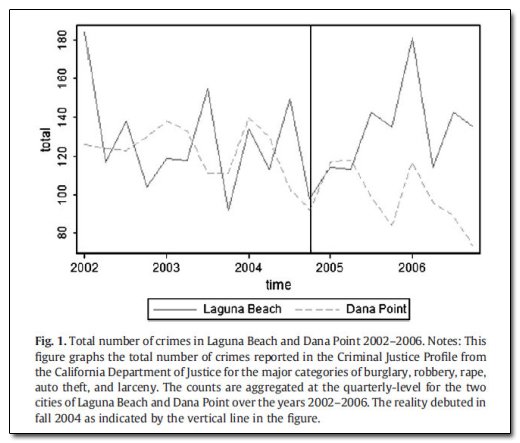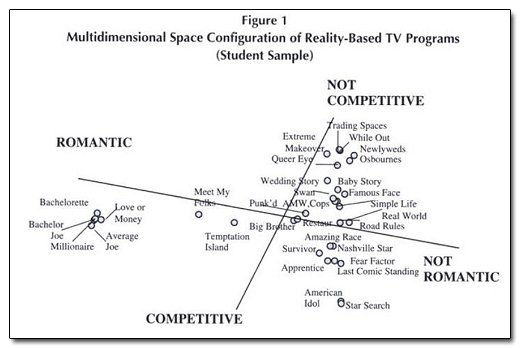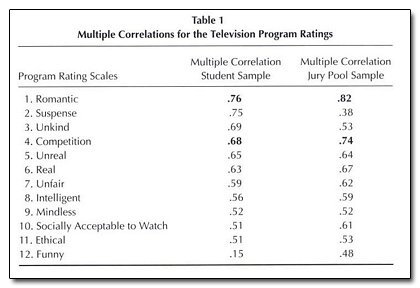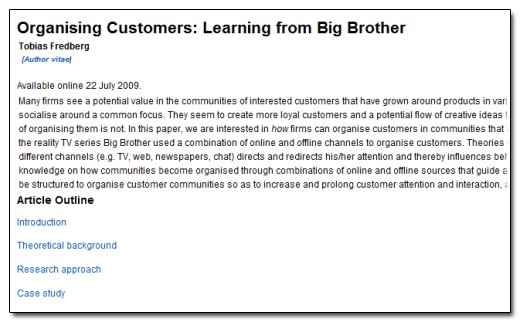6 Studies That Prove Reality TV Is Causing the Apocalypse

Lots of people joke about reality TV being the end of civilization, and many of them are us, but we weren't really worried. Until we found out what scientists were saying. Hard data and scientific papers spell out exactly how reality television is undoing civilized society, aka "the thing that keeps us from killing and eating each other for fun."
People Watch Reality TV For Horrifying Reasons

"Why People Watch Reality TV"
Professor Steven Reiss, Dr. James Wiltz
Ohio State University
Media Psychology, 6, 363-378 (2004)
For years, scientists have been trying to answer the question, "Why do people watch reality TV?" -- a question that was revised to "WHYYYYY? Oh my God, why are they doing this?" sometime around the premiere ofA Shot at Love With Tila Tequila.

There had better be a damn good reason for this.
The early money in academic circles was on voyeurism. Watching strangers interact with one another on TV seemed to appeal to humanity's inner Peeping Tom. However, voyeurism implies that the people you're watching don't know they're being watched. Reality TV stars were only getting more self-aware, and the ratings were only growing.
Deciding it was time to go back to the drawing board, two idealistic Ohio State researchers decided to compare viewing behaviors and personality profiles using Aristotle's model of the human soul. It was at this point that they discovered, to their horror, that the voyeur theory wasn't too cynical. In fact, when it comes to why we watch reality TV, the theory equating a large swath of humanity with lonely men masturbating in trees wasn't cynical enough.

Way to make humanity look like complete assholes, SCIENCE.
The adult fans of reality TV whose personalities they mapped ended up having pretty much all the worst traits possible. Professor Reiss himself writes that "the people who watched reality television had above-average trait motivation to feel self-important and, to a lesser extent, vindicated, friendly free of morality." If each personality profile was a different Christian Bale character, Patrick Bateman would be the model reality TV viewer.
Their theory was that reality TV was essentially the antidote to self-improvement: Instead of feeling better about yourself by achieving anything, you can just watch the worst possible humans fawn over Flava Flav for half an hour! It's like a Hot Pocket for your self-esteem -- quick, easy and overall bad for you.

In an objective, scientific sense, listening to this man talk erodes your soul.
The study also found that those who watched reality TV were far more concerned with social status and vengeance, and significantly less motivated by idealism, morality or honor. In other words, asking people whether they watch My Big Fat Obnoxious Fiance is a great way to discover who'll be wearing the leather after Mad Max happens.

His Reiss Profile "social status" score is Humongous.
It Actively Damages Civilizations

"The reality of reality television: Does reality TV influence local crime rates?"
Professor Lesley Chiou, Professor Mary Lopez
Department of Economics, Occidental College, Los Angeles, CA, United States
Economics Letters 108 (2010), 330-333
The problem with academia is that it tends to lag behind the latest trends by a few years. For instance, we couldn't find any scientists who had undertaken research on Jersey Shore, or at least none who hadn't immediately switched to researching interplanetary travel. The closest we came was an expert on viral weaponry who disappeared while researching Snooki, leaving behind only a voice mail message that said, "Call me when she decides she can sing. I'll be ready."

Her YouTube page may be the most convincing argument against the existence of a loving god.
Unfortunately, that lag might mean it may already be too late. While we're not saying reality TV causes an immediate decay in any societies it directly impacts, that's exactly what two Occidental College professors found last year with their statistical analysis of the reality show Laguna Beach. One part of their analysis compared the titular setting of the reality show with the statistically similar, but relatively untelevised, town of Dana Point.

While Dana Point's crime rate continued to drop along with the rest of America's throughout the 2000s, being the setting of a reality show acted as a spring board for crimes like "burglary, robbery, rape, auto theft, and larceny" in Laguna Beach. One theory is that the region was flooded with people who wanted to either be like the rich idiots on the show or take advantage of them. Another posited that the criminal underground has no respect for life, law or property but has a well-developed sense of justice against that bitch Alex.
Of course, one graph doesn't imply causality. Still, it's worth noting that the professors applied more statistical analysis to Laguna Beach than early scientists did to powered flight. For instance:

The existence of a mathematical equation involving Laguna Beach just lowered IQ.
Not anybody's in particular; the idea of IQ itself was lowered by this equation.
Their conclusion? "We find suggestive evidence that non-residential burglaries, auto thefts, and rapes increased during the period following the show's debut." TV doesn't just appeal to Mad Max types -- it's actually causing them.

A future gated community.
Of course, that's only the specific location where the show was filmed. As long as we're not watching Jersey Shore while sitting on the Jersey Shore, it's safe to sit back and watch it from a distance, right?
Mere Exposure to Reality TV Makes You a Worse Person

"The Influence of Plastic Surgery 'Reality TV' on Cosmetic Surgery Patient Expectations and Decision Making"
Richard J. Crockett, M.D.,Thomas Pruzinsky, Ph.D.,John A. Persing, M.D.
"A correlational and experimental examination of reality television viewing and interest in cosmetic surgery"
Charlotte N. Markey, Patrick M. Markey
People watch these shows and talk about them -- that just means they're both bored and boring, right? Surely they don't take them seriously? On a scale of seriousness, from "1" to "Getting themselves cut open with knives," two studies show that fans of reality TV take what they're watching extremely seriously.
A survey of first-time plastic surgery patients found that 78 percent were influenced by reality television, and 57 percent of all first-time patients were "high-intensity" viewers of cosmetic surgery reality TV.

The fact that that's even a genre will cost us dearly when the transmissions reach more advanced alien species.
The paper discussed "widespread unease" the how many people were getting plastic surgery because of these programs. Worth noting: This paper appeared in a journal by, for and dedicated to people who make their living performing plastic surgery. They routinely patch up victims of motorbike crashes and industrial machinery, and the reason for getting plastic surgery they're most scared of is reality TV. Probably because using artificial means to become more like reality TV contestants is the exact opposite of evolution.

Above: The fittest?
This isn't just normal vanity, or an obvious correlation like how people interested in surgery would watch the shows. Another study, this one involving 189 people, found that those merely "exposed" to Extreme Makeover (note that the scientists referred to the show the same way they'd refer to nuclear waste) were more likely to want surgery. After only 20 minutes, a group watching Extreme Makeover was measurably more interested in surgery compared with a control group watching Sell This House. Unfortunately, no data were collected on the frivolous purchases of unused power tools by the second group.
Terrifyingly, the study showed that the people's self-esteem, gender or happiness with their looks didn't affect how much the show influenced them. The only thing that mattered was whether they'd watched the show.

"Boy, having someone slice off sections of my face sure seems more bearable than watching this show."
There Is More Reality TV Than Science (And We) Can Handle

"Determining Dimensions of Reality: A Concept Mapping of the Reality TV Landscape"
Robin L. Nabi, Professor, U. Penn.
Journal of Broadcasting & Electronic Media, June 2007
That title might sound like something Reed Richards would shout before accidentally opening a portal to hell in downtown Manhattan, but it's even worse: There are now so many reality shows that researchers are trying to map them. Like an oceanic trench, but with even more horrific abominations in it.

Science confirms that the giant isopod is a more medically advisable sexual partner than any Bachelor ever.
There are now so many reality shows that a scientist had to apply multidimensional scaling to map them, though she may lose that job title because of it. A study of 300 locals found that the only two themes they all agreed on were "romance" and "competitiveness," making Pennsylvania possibly the worst place for dating or small talk in the entire world.


They prove their scaling works because they realize that Newlyweds and Wedding Story -- shows about people who decide to sell their own marriages for fame -- are measurably less romantic than Punk'd.
Professor Nabi concluded with concerns about how viewers were being reprogrammed with romance and competition as their two main drives. "Repeated pairing of these two attributes might create and/or reinforce the view of potential mates as prizes to be won rather than cherished long-term relational partners." Reality TV actively ruins romance for the next generation by turning it into an ugly fight.

Thanks, science. We hadn't worked that one out.
It Even Manages to Make the Internet Dumber

"Reality Television as a Model for Online Behavior: Blogging, Photo, and Video Sharing"
Professor Michael A. Stefanone, Ph.D., Derek Lackaff
State University of New York
Journal of Computer-Mediated Communication 14, p964, 2009
A study at the State University of New York linked reality TV with the need to share every pointless detail of your life online and accelerated the downfall of human intelligence by giving 100 students class credits for talking about reality TV. That's the exact opposite of what universities are for. Professor Michael Stefanone found a significant association between the quantity of RTV consumed and the decision to maintain a blog full of "nondirected self-disclosure," the most scientific-sounding way to describe talking about what you had for lunch.

"How did people tell strangers about their sex lives before the Internet?"
Growing up with reality television teaches you that sharing every irrelevant thought as publicly as possible isn't the province of lunatics in trench-coats and attention whores but is "normative" and "prosocial," which we're fairly sure are psychobabble words for good things. Keeping Up With the Kardashians being taken as the basis of a society makes 1984 look like a nice future. Hell, it makes Fallout 3 look good.

We'd prefer global nuclear war to the invention of the spray-on tan.
It's a cargo cult: They see people with absolutely no ability becoming famous, sharing absolutely every irrelevant detail of their lives with the world, and confuse one of the effects with the cause. They then proceed to pour out every pointless emotion in a never-ending toxic spill of weaponized boredom.
The One Way Reality TV Seems to Be Useful

"Organizing Customers: Learning From Big Brother"
Professor Tobias Fredberg
Chalmers University of Technology
Long Range Planning 42 (2009), 320-340
So the arts and sciences used statistical analysis, mathematical modeling and freaking Aristotle to take a long, hard look at reality TV and were at best confused and at worst, found themselves looking into the inky black eyes of a murder bot in the moments before they roll over white and begin to attack. But surely all our viewing behaviors are telling someone something useful.

The title 'Organizing Customers: Learning From Big Brother" combines more horror and blatant exploitation than Shaft filming a Saw sequel. It couldn't imply the viewers were sheep harder if it somehow suggested they be ground up for mutton. That would still be more respectful, because even farmers don't use the phrase "and hence enable extraction of value." Which isn't just a quote from the paper, but the stated goal of the paper from the intro.
The paper reads like it was written by Terminators. If you replaced every incidence of "customers" with "toasters," there would be more human emotion because it would at least be surprising to read that toasters had money. But there is nothing surprising about this analysis of fan behavior. At least not to anyone who was paying attention to every cartoonishly evil businessman to ever kill the good guy without a trace of remorse, or any of Bill Hicks' observations about advertisers.

He once ate a marketing director's heart.
Beyond their capacity for spending money, there is literally no way to detect that the researchers are talking about living beings. For instance, the abstract notes that, "As their commitment grows, they become prepared to spend more to access new streams of Big Brother information." You only need to look at the fact that people are now buying seasons of reality shows on DVD to see that TV executives have learned from Big Brother's ability to get us to spend.

We're fairly certain watching any episode on this DVD more than once qualifies as a severe mental disorder.
But is it just a fad? Well, things keep happening if they make money. And reality TV is making a lot of money, thanks to the fact that a real TV show costs over a million dollars to make, while a reality show costs around $100,000. They're so cheap that many of the people winning the cash prizes could fund their very own shows. A Survivor winner could produce an entire six-episode series. And when that happens, future readers, it should be taken as the signal to climb into your Repulsor Armor and begin Operation: Purge. Don't worry -- your targets will all be held motionless for at least 30 minutes.
Be sure to pick up our book since we're guessing you probably shot your TV after reading that.
For more reasons to huck your television out of a window, check out 5 Ways Television Went Crazy Since I Quit Watching in 2003 and 6 Deadly Injuries You Think You'd Survive (Thanks to Movies).